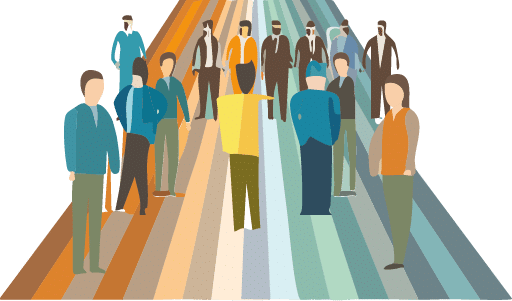
Accelerating Sustainable Health Through Transdisciplinary Collaboration
What is SHIP?
Sustainable Health in Partnership (SHIP) is a transdisciplinary platform that strengthens and accelerates initiatives tackling complex global challenges that impact health. It connects Swedish universities and partners working to advance ecological, social, and economic sustainability for health.
Through SHIP, partners gain access to:
- Collaborative spaces for innovation, capacity-building, and knowledge exchange
- Tools and methods to support successful collaboration
- Diverse expertise, new partners, and opportunities for impactful cross-sector engagement
SHIP is driven by Karolinska Institutet, Swedish University of Agricultural Sciences, Umeå University, Uppsala University, and Örebro University.

Diverse perspectives on sustainable health
Shape the future of sustainable health
We invite students, teachers, researchers, and cross-sector partners to contribute with their views on sustainable health.
> Read more
Partnerships
New perspectives on sustainable health—A dialogue series
Join the dialogue series that brings together diverse perspectives from across disciplines and sectors to explore the concept of sustainable health.
> Read more
Ship collaboration initiatives
SHIP is launching start-up collaboration initiatives to enhance understanding and support for interdisciplinary and transdisciplinary work.
> Read more
Networking the networks
SHIP promotes several university and cross-sector networks that work in alignment with SHIP’s mission.
> Read more
Connect and collaborate
SHIP partners with students, researchers, teachers, and cross-sector collaborators to strengthen and scale ideas for sustainable health.
> Read more

Spotlight on Aligned Projects
SHIP is committed to promoting initiatives that align with its mission.
> Read more
Global challenges impacting health
We live in an era defined by rapid change and complex global challenges that profoundly impact health. From climate change and pandemics to rising social inequalities and geopolitical shifts global challenges are deeply interconnected, often amplifying one another in complex ways.
Why ship?
SHIP strives for transdisciplinary collaboration, aligning research with real-world needs, and building systems for practical implementation.
> Read more
Complex global challenges
Climate change, Environment and Biodiversity; War, Conflicts and Displacement; Misinformation, Disinformation and Trust in Science.
> Read more
Sustainability and health
SHIP explores how sustainable health can serve as a unifying concept across disciplinary boundaries.
> Read more
Andreas Berglöf
Policy Advisor Health | WaterAid
What does sustainable health mean to you in your work, field of research, or studies?
– Sustainable health for WaterAid means that everyone, everywhere and all the time has access to clean water, sanitation and hygiene (WASH).
What is your most pressing question, and how does it relate to sustainable health?
– A healthcare facility without water, sanitation and hygiene (WASH) poses significant risks to staff and patients (not least to mothers and babies), and contributes to millions of healthcare-acquired infections each year. These infections results in prolonged hospital stays, long-term disabilities, increased antimicrobial resistance, higher healthcare costs for families and health systems, and death.
Mariam Claeson
Senior Advisor, Global Public Health | Karolinska Institutet
What does sustainable health mean to you in your work, field of research, or studies?
– Sustainable health is an integral part of what we do to ensure that the impact of our work to improve health lasts, that good practices and standards are upheld and continuously improved, so that the effects of change are maintained beyond the duration of a project or budget period.
What is your most pressing question, and how does it relate to sustainable health?
– The most pressing question in my current work is how to mobilize additional resources for priority public health challenges, such as newborn survival or adolescent mental health, that secures sustainable financing for impact at scale and leads to transformative change.
Henrik Larsson
Professor of Psychiatric Epidemiology | Örebro University
What does sustainable health mean to you in your work, field of research, or studies?
– Sustainable health, in the context of my research on mental health problems across the lifespan, means fostering long-term mental well-being through prevention, early intervention, and continuous support throughout different life stages.
What is your most pressing question, and how does it relate to sustainable health?
– My most pressing question is how to effectively integrate mental and physical health care to reduce the gap in physical health for people with mental health problems.
Kalle Grill
Associate Professor in Philosophy | Umeå University
What does sustainable health mean to you in your work, field of research, or studies?
– Human health that persists over time and over generations, consistent with the health or well-being of both natural ecosystems and agricultural plant and animal life.
What is your most pressing question, and how does it relate to sustainable health?
– How do we measure population health and well-being over time, as the members of the population are substituted by births and deaths?
Karin Hugelius
Associate Professor of Nursing Science | Örebro University
What does sustainable health mean to you in your work, field of research, or studies?
– As a researcher within disaster medicine, I see at least two perspectives of sustainable health; first, extreme weather events will affect more people in the future, and we need to prepare for example the community health care services to be resilient to heatwaves as well as for flooding. Second, a sustainable health care is depending on resilient health care professionals, even during challenging situations.
What is your most pressing question, and how does it relate to sustainable health?
– Given the situation in the world, it is strongly needed to invest in research on how to prevent and mitigate negative health effects from such events, but also how to respond. To me, one of the core questions is how to prepare health professionals for crisis like a disaster or armed conflict and how disaster readiness can be achieved.
Daniel Metcalfe
Professor in Terrestrial Ecology | Umeå University
What does sustainable health mean to you in your work, field of research, or studies?
– Well functioning natural biomes which maintain key ecosystem services, interactions among components, and populations of native species.
What is your most pressing question, and how does it relate to sustainable health?
– How do we maintain well functioning biomes whilst meeting the needs of human populations?
Aida Bargues Tobella
Associate Professor of Soil Sciences | Swedish University of Agricultural Sciences
What does sustainable health mean to you in your work, field of research, or studies?
– The term sustainable health is broad and open to interpretation, allowing for flexibility. For me, it [sustainable health] represents the continued capacity of social-ecological systems to sustain the health of their different components – including people, plants, soil, animals, and the broader environment – over the long term. The health of one component is intrinsically linked to the health of the other components. My research revolves around restoring degraded lands, which essentially means enhancing their health. Land restoration is critical to improving human and ecological health, for instance, through improved habitat or enhanced food and water security.
What is your most pressing question, and how does it relate to sustainable health?
– One of the most pressing questions is the ‘triple crisis’ of climate change, biodiversity loss, and land degradation. These crises are intrinsically linked and mutually reinforcing and pose a serious threat to sustainable health. Restoration is a nexus solution to these crises and has a huge potential to improve health at different levels.
Soorej Jose Puthoopparambil
Researcher and Senior lecturer, Migration and Global health | Uppsala University
What does sustainable health mean to you in your work, field of research, or studies?
– My area of work is migration and health. The most directly relevant aspect of sustainable health, as defined by Rhoda K. Wanyenze et al 2023, in my area of work is the health and wellbeing for all. My work is focused on reducing inequalities in health and wellbeing between various groups of refugees and migrants, and host communities.
What is your most pressing question, and how does it relate to sustainable health?
– One of the key questions that I work with is on how to prevent health inequalities being created or exacerbated, amongst migrants, and between host communities and migrants, due to less /non-inclusive public health policies. One of the main focus areas of my research is to better understand how poor governance creates poor health among migrants and health inequality between migrants and host communities. Due to lack of proper governance, root causes and consequences of conflicts and disasters are not addressed adequately, often forcing people to migrate. The need to rethink the partnerships amongst low- and middle income countries (region of origin for majority of migrants), and between low- and middle income countries and high income countries (region of destination for many migrants) is vital to safeguard and promote health of all, including migrants and host communities.
Niels Krämer
Doctoral Student in Cell Biology | Karolinska Institutet
What does sustainable health mean to you in your work, field of research, or studies?
– Sustainable health to me means that the health of all people is safeguarded whilst at the same time adhering to the planetary boundaries so future generations will be able to enjoy the same (or ideally better) levels of health.
What is your most pressing question, and how does it relate to sustainable health?
– Currently, a lot of research in my own field is aimed at finding therapies for non-communicable diseases, whereas I believe we should be investing more resources in understanding the onset of these diseases so we can implement policies that will prevent them. Doing this will be beneficial to individuals, society at large and the planet.
Susanna Sternberg Lewerin
Professor in Epizootiology & Disease Control | Swedish University of Agricultural Sciences
What does sustainable health mean to you in your work, field of research, or studies?
– Sustainable health in my work means good management of animals and the environment, preventing infectious diseases by good biosecurity and promoting a healthy lifestyle by caring for animals and the environment.
What is your most pressing question, and how does it relate to sustainable health?
– How to prevent infections and maintain the effectiveness of antibiotics without causing environmental and social harm.
Karin Strömstedt
International Advocacy Advisor | UNICEF Sverige
What does sustainable health mean to you in your work, field of research, or studies?
– Sustainable health means starting from the child and ensuring that immediate lifesaving care is paired with long-term systems that protect and promote well-being. It’s about combining urgent interventions with investments in resilience and equity and for governments to take on this responsibility so that services remain strong for generations.
What is your most pressing question, and how does it relate to sustainable health?
– My most pressing question is how we can ensure that policies and funding prioritize long-term health system resilience alongside short-term crisis response, so that progress in health is equitable, lasting, and child centered.
Peter Stenvinkel
Professor in Nephrology | Karolinska Institutet
What does sustainable health mean to you in your work, field of research, or studies?
– I work with failing kidneys. The kidneys are particularly vulnerable to a rapidly changing environment. It can be hypothesized that the rising global incidence of kidney disease reflects the impacts of climate change. As such, kidney disease may be considered the “black lungs” of climate change. Scientific research has shown that various factors – including the consumption of ultra-processed foods, insufficient access to clean water, viral pandemics, exposure to toxins, heat stress, air pollution, psychosocial stress, and urbanization – contribute to the growing global burden of kidney disease. Sustainable health in kidney disease focuses on preventive care, holistic and patient-centered approaches, interdisciplinary collaboration, environmental sustainability in treatments, and equitable access to care and resources.
What is your most pressing question, and how does it relate to sustainable health?
– On a global scale the most pressing question is how we effectively can integrate preventive healthcare practices and community education into existing healthcare systems to reduce the incidence of chronic kidney disease, especially in high-risk populations?
Annika Egan Sjölander
Professor in Media and Communication studies | Umeå University
What does sustainable health mean to you in your work, field of research, or studies?
– I associate sustainable health with well-being of the environment, societies and individuals and other living beings, co-existing and thriving within the planetary boundaries. Health and well-being of people and the planet have been both a topic and some kind of foundation in most research projects of mine throughout the years. All rooted in a care for the commons. As a media and communication scholar I focus on how we as societies handle complex challenges of our time and what role(s) communication plays in that.
What is your most pressing question, and how does it relate to sustainable health?
– The role of communication to enable more sustainable societies in the Anthropocene is a major concern, both theoretically and practically, including its many varied forms and power asymmetries. We simply cannot handle complex matters together without robust communication, built on trust between actors and legitimacy for the outcome of decision-making processes, be it about health matters or sustainability projects of other kinds. Meaning-making is central to study.
Emric Furberg
Student at Department of Chemistry | Uppsala University
What does sustainable health mean to you in your work, field of research, or studies?
– Generally I’d argue that it depends on which perspective you take on it, be it a more personal level or a societal one. Personal sustainable health I believe is all about being able to achieve a good balance in life and the studies may definitely play a large role in that, especially in terms of fulfillment. But it is just as important to leave enough room for sleep, leisure, and time for care; like meal preparation, laundry, and cleaning. In this, the studies have a responsibility in providing that space, whilst performing a good education. Specific to my studies as a bachelors in chemistry are laborations, which introduce a lot more factors especially in regards to reagents. Whilst all reagents are risk assessed the fact of the matter is that we still use really harmful compounds, both to ourselves and the environment. There an important balance needs to be struck as to still produce a good learning environment, like performing a certain reaction whilst minimizing the risks of harm and long term effects.
What is your most pressing question, and how does it relate to sustainable health?
– The most pressing question for me is to how a lot of reagents can be sourced in a more sustainable way. Hydrocarbons, for instance, are incredibly common and important in the lab. But are, despite their simple structure, almost all sourced from non-renewable sources like crude oil. This is seldom reflected on when observing the bottles in the reagent cabinet, but they need to be more sustainably used and waste needs to be taken care of. Metals also produce similar issues and alternatives to rare minerals are need to be discovered, not just to minimize the environmental impact, but also to promote sustainable health in all parts of the production chain.
Tobias Lindström Battle
Specialist, Climate Resilience & Health, World Economic Forum
What does sustainable health mean to you in your work, field of research, or studies?
– From the perspective of our work at the nexus of climate change and health, sustainable health is where our economic and social systems function in a way as to ensure the health of our communities confronted with climate challenges, allowing people to live fulfilling, prosperous lives.
What is your most pressing question, and how does it relate to sustainable health?
– The health impacts of climate change are impacting our most vulnerable communities and creating occupational hazards world-over, not least from extreme heat. Implementing preventive interventions to protect communities and workers ensures sustainable health, communities, and economies.
Idil Shekh Mohamed
Technical Officer, Health Policy and System Research, World Health Organization
What does sustainable health mean to you in your work, field of research, or studies?
– For me, sustainable health goes beyond simply advocating for everyone’s right to health, it’s about how we understand and respond to the connections between people, evidence, and the systems that shape our health and wellbeing. This requires creating spaces where knowledge and lessons are shared and used, not just generated, so that decisions are rooted in both research and lived experience. In my work, it’s about helping health systems learn, adapt and grow stronger in the face of change, as overlapping crises, including climate change and conflict, redefine what resilience means.
What is your most pressing question, and how does it relate to sustainable health?
– I often wonder how we can become better at linking evidence to policy and action, not just in generating knowledge, but ensuring it truly shapes the decisions and interventions that affect people’s health and wellbeing. For me, sustainable health depends on building systems that continuously learn from evidence, from communities, and from each other, so that our responses remain grounded, adaptive and just. And we need to communicate this evidence more effectively and more compellingly to stakeholders.
Mats Målqvist
Professor of Global Health, Uppsala University
What does sustainable health mean to you in your work, field of research, or studies?
– Sustainable health is about everyone’s possibility to develop and become their full potential. This means equity, without structural barriers or violence in an environment that is conducive and free from destructive elements or threats. Thus, sustainable health is at the centre of social, economic and ecological sustainability.
What is your most pressing question, and how does it relate to sustainable health?
– The most pressing concern is how to get different actors, disciplines and traditions to work together. Not to break the classical silos but to learn and be inspired by each other and come together to deal with the polycrisis we all are facing. For sustainable health the main challenge is how to maintain and improve the health gains of the past decades while reducing our ecological footprint.
Klas Palm
Researcher in Transition Management, Uppsala University
What does sustainable health mean to you in your work, field of research, or studies?
– For me, it is one of several important social sustainability perspectives. Equitable access to good healthcare is a cornerstone of the societal contract and an inclusive society.
What is your most pressing question, and how does it relate to sustainable health?
– The most important issues are probably biodiversity, species’ ability to coexist, and humanity’s capacity to create democratic societies. Efforts for sustainable health should not come at the expense of these other dimensions of sustainability. We need to work to avoid goal conflicts between sustainability goals. Furthermore, it is true that when people are in good health and feel that society cares about their well-being, they are more likely to have the strength and motivation to engage with these other dimensions of sustainability.
Walter Osika
Associate Professor in Clinical Neuroscience, Karolinska Institutet
What does sustainable health mean to you in your work, field of research, or studies?
– To me, sustainable health integrates physical, mental, existential, ecological, social, economic and political dimensions. It extends across the entire life cycle of all sentient beings and the environment and is built on regenerative and circular principles. Sustainable health is not merely about sustaining human life but about fostering thriving ecosystems and societies in balance with planetary boundaries.
In my work as a physician, researcher, and advocate for social sustainability, I see health as deeply interconnected with the broader environment and societal structures. For instance, mental and existential well-being cannot be separated from the social fabric or the state of our planet. This understanding informs my research on mental health and sustainability, where I explore how innovative approaches might foster well-being and resilience on both individual and collective levels.
What is your most pressing question, and how does it relate to sustainable health?
– A pressing question I grapple with is: How can we expand and implement frameworks like Planetary Health and One Health to address the interconnected challenges of animal and human health as well as ecosystem vitality, while moving beyond anthropocentric worldviews?
Current health systems remain rooted in short-term, human-centered paradigms that often neglect planetary limits and non-human life. To achieve true sustainable health, we must integrate these frameworks into health care, policy, and urban planning, fostering approaches that prioritize long-term ecological regeneration, equity, and existential well-being. I believe this transformation is not only urgent but foundational to securing a thriving and resilient future for all.









